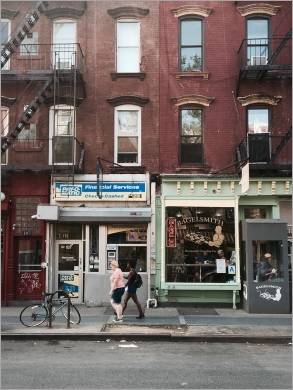New York City’s immigrant- and minority-owned small businesses have been disproportionately devastated by the coronavirus pandemic, while struggling to access the government relief programs that could help them weather the storm. To help tackle these challenges, during the summer of 2020 CUF convened a three-part series of live-streamed discussions focused on specific policy solutions to support the city’s diverse small businesses.
Across the three policy forums, generously supported by HSBC, audiences heard from small business owners, policymakers, community leaders, and business assistance organizations about the unique challenges facing immigrant- and minority-owned businesses—and what elected officials, businesses, and consumers can do to help. Speakers included U.S. Senator Charles E. Schumer, Brooklyn Borough President Eric Adams, State Senator Roxanne J. Persaud, Assemblymember Catalina Cruz, City Councilmember Francisco Moya, and City Councilmember Ben Kallos, as well as small business owners like Arepa Lady’s Alejandro Osorio and Tren’ness Woods-Black of Sylvia’s Restaurant.
The series concluded on August 12th with an event focused on the diverse central Queens neighborhoods of Jackson Heights, Elmhurst, and Corona, which have been hit especially hard by the pandemic. It followed our July 24th symposium focused on Brooklyn businesses, and a five-borough discussion held on May 28th. All three events are available to be streamed on demand.
These discussions generated dozens of concrete ideas to help these businesses get through the crisis, including the following five key recommendations that surfaced during all three of our discussions:
- To ensure government programs reach underserved businesses, partner with Community Development Financial Institutions (CDFIs) and other community-based organizations. Thousands of immigrant- and minority- owned small businesses citywide have been unable to access federal, state, and city grant and loan programs. To ensure better results for future relief programs, government should focus on partnering with CDFIs and other trusted community-based assistance organizations. By directing relief through these institutions, promoting outreach, and pooling resources, government can ensure that new efforts reach businesses that have so far been left out.
- Greatly expand the open streets program to include retailers, vendors, and more. Immigrant- and minority-owned small businesses need customers, and the opening up of streets and sidewalks to neighborhood restaurants has brought in much-needed revenue. But the city should go much bigger with this approach, from opening up entire streets and public parks for local commerce, to convening weekly neighborhood street fairs and transforming underutilized lots into community markets for local retailers. At the same time, the city should start planning now for the colder months so that these recent gains do not disappear.
- Create a citywide framework for commercial rent relief. For many immigrant- and minority-owned small businesses, rent is a much greater expense than payroll. But with revenues plummeting, few small businesses are in a position to pay, and many fear that they will lose their leases before the economy has a chance to recover. The city and state should take the lead and convene businesses, landlords, and financial institutions to find a common solution, including guidance on renegotiation of lease terms; deferment of real estate taxes, mortgage payments, and rent; and efforts to avoid evictions.
- Go door-to-door to help small businesses access the assistance that already exists. The city, state, and federal government are providing programs that can help immigrant- and minority-owned businesses weather the crisis, but small business owners are often unaware of these programs, may not know that they qualify, or struggle to comply with the bureaucratic requirements. The city should go door-to-door in hard-hit communities to recruit and inform business owners; market existing grant, loan, commercial lease, hiring, open streets, and legal assistance programs in multiple languages; and partner with community-based organizations to drive much greater uptake.
- Extend the programs that have kept countless small businesses afloat. Paycheck Protection Program (PPP) loans and the additional $600 in unemployment benefits—among other programs—have enabled small businesses and solo entrepreneurs across the city to sustain themselves over the past several months. Faced with mounting uncertainty as the economic slowdown continues, small businesses will need renewed financial support until the pandemic is completely under control, or many more will be forced to close.
For more, check out CUF’s takeaways from these events and other recent research:







